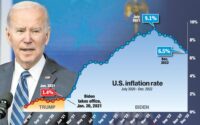For first time, more Democrats side with Palestinians than Israelis: poll
More Democrats back the Palestinian cause in the Middle East conflict for the first time ever, a new Gallup poll has found — putting them at odds with both Republicans and the US as a whole.
The survey found that 49% of Democrats said their sympathies were more with the Palestinians than the Israelis, while 38% said the opposite and 13% said their sympathies were with both sides, neither side, or that they had no opinion.
Democratic affinity for the Palestinians has more than tripled over the past two decades from a low of 16% in 2003.
By contrast, party members’ support for the Israeli cause has plummeted from a high of 58% in 2014.
The percentage of independents who support the Palestinians over the Israelis has grown 21 percentage points to 32% over the previous 10 years, but a plurality still back Israeli (49%) — though that number is down 14 percentage points from 2013.



Republican attitudes toward the conflict have remained relatively consistent over the past two decades, with 78% siding with the Israelis compared to 11% backing the Palestinians.
GOP sympathy for the Israelis hit a high of 87% in January 2018 before falling off to 76% the next year, then rebounding to 86% in January 2020.
Overall, Americans’ sympathies lie with the Israelis (54%), but their feelings for the Palestinians (31%) are at their highest.
That 23-point gap marks the first time Israel has not had a more than 2-to-1 advantage over the Palestinians among Americans, the poll shows.

Setting aside political differences, Gallup also noted the generational differences in attitude toward both groups.
Net positive feelings for the Israelis are highest among Baby Boomers (46 points), Generation X (32 points) and the Silent Generation — those born between 1928 and 1940 (31 points).
Millennials are divided, with 42% of that generation sympathizing with the Palestinians and 40% with the Israelis.

Gallup chalks up the changing views about Israelis and Palestinians to the polarizing political climate, but also points to other reasons why Democrats have altered their views.
“The escalation of Israeli-Palestinian hostilities over the past year, resulting in a high number of Palestinians killed, could partly explain the most recent shift in Democrats’ perspective,” it said.
“But Democrats’ waning religiosity may be a factor in the longer-term trend. Sympathy for Israel has historically been highly correlated with religion, with those attending religious services weekly being much more sympathetic to the Israelis than those who seldom or never attend.”


